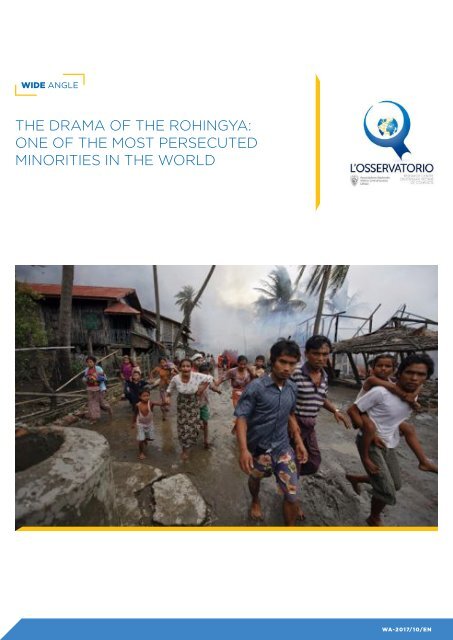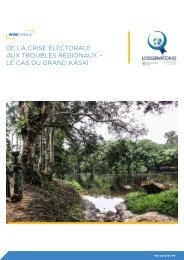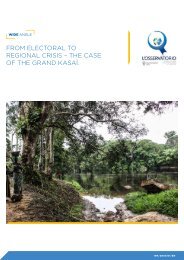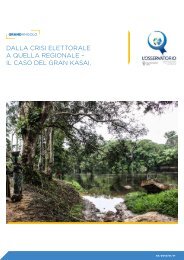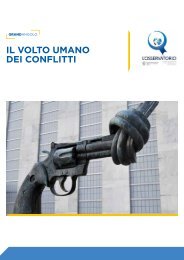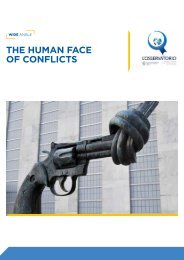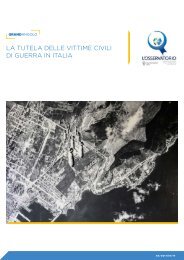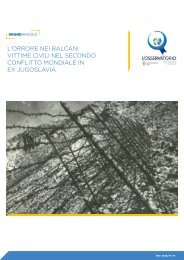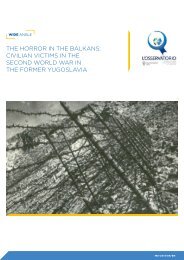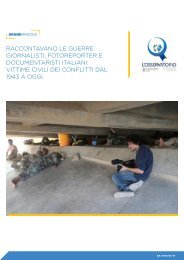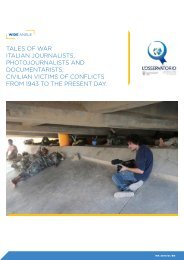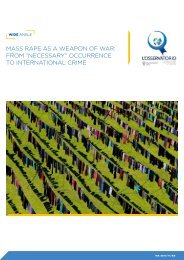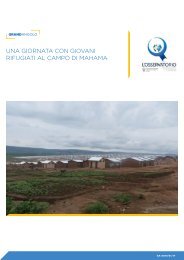The drama of the Rohingya
Create successful ePaper yourself
Turn your PDF publications into a flip-book with our unique Google optimized e-Paper software.
THE DRAMA OF THE ROHINGYA:<br />
ONE OF THE MOST PERSECUTED<br />
MINORITIES IN THE WORLD<br />
WA-2017/10/EN
Author: Alessandro Lira and Irgena Lemnushi<br />
Editing: Peter Ford (UN online volunteer)<br />
Graphics: Vilmar Luiz<br />
Cover photo: <strong>Rohingya</strong> escaping from a fire in Sittwe, June 10, 2012.<br />
Soe Zeya Tun / Reuters<br />
Copyright © 2017<br />
L’Osservatorio – Research Center on Civilian Victims <strong>of</strong> Conflict<br />
Via Marche, 54<br />
00187 Rome – Italy<br />
For fur<strong>the</strong>r information and comments, please contact:<br />
@OsservatorioOrg<br />
losservatorio.org<br />
info@losservatorio.org<br />
This research is an independent publication commissioned by L’Osservatorio. <strong>The</strong> analysis,<br />
conclusions and recommendations expressed in this document do not necessarily represent<br />
<strong>the</strong> <strong>of</strong>ficial position <strong>of</strong> L’Osservatorio. <strong>The</strong> text material may be freely reproduced with proper<br />
citation and / or attribution <strong>of</strong> <strong>the</strong> author and publisher.<br />
2
<strong>The</strong> humanitarian crisis that is taking place on <strong>the</strong> border between Myanmar and Bangladesh<br />
involves one <strong>of</strong> <strong>the</strong> most persecuted minorities in <strong>the</strong> world: <strong>Rohingya</strong> Muslims.<br />
For decades <strong>the</strong> military in Myanmar have accomplished severe repression against this<br />
minority, causing hundreds <strong>of</strong> deaths and thousands <strong>of</strong> refugees according to NGOs<br />
and <strong>the</strong> media, but denied by Burmese authorities.<br />
<strong>The</strong> violence against <strong>the</strong> <strong>Rohingya</strong> has intensified since 25 August 2017, when Burmese<br />
security forces were attacked by militiamen from <strong>the</strong> <strong>Rohingya</strong> paramilitary group Arakan<br />
<strong>Rohingya</strong> Salvation Army (ARSA).<br />
ARSA said this attack was <strong>the</strong> result <strong>of</strong> increased harassment <strong>of</strong> <strong>Rohingya</strong> communities,<br />
but its direct result has been systematic violence and violent eviction by Burmese security<br />
forces and Buddhist civilians against <strong>the</strong>ir <strong>Rohingya</strong> neighbours. <strong>The</strong> clashes have<br />
caused hundreds <strong>of</strong> deaths in <strong>the</strong> state <strong>of</strong> Rakhine and have initiated an exodus that<br />
has forced at least 600,000 <strong>Rohingya</strong> Muslims to cross <strong>the</strong> treacherous border with<br />
Bangladesh. <strong>The</strong> majority are women and children, who are among more than 300,000<br />
refugees who found shelter in Bengali territory since August.<br />
Humanitarian organizations including Human Rights Watch and Amnesty International<br />
have denounced <strong>the</strong> murder, rape and property burnings against Myanmar’s Muslim<br />
community and <strong>the</strong>ir villages.<br />
<strong>The</strong>se acts, loudly denounced by <strong>the</strong> United Nations – which has been criticised for<br />
perceived lack <strong>of</strong> action on <strong>the</strong> matter –, have raised <strong>the</strong> accusation against Myanmar<br />
<strong>of</strong> implementing a policy <strong>of</strong> ethnic cleansing, a hypo<strong>the</strong>sis rejected by <strong>the</strong> country’s<br />
de facto leader, Aung San Suu Kyi. Nobel Peace Prize winner in 1991, Suu Kyi has been<br />
widely accused by <strong>the</strong> international community for failing to intervene in <strong>the</strong> growing<br />
crisis, and for remaining silence about <strong>the</strong> violence against <strong>the</strong> <strong>Rohingya</strong>.<br />
Keywords: migratory crisis, <strong>Rohingya</strong> exodus, Myanmar, rights denied, ethnic cleansing,<br />
Aung San Suu Kyi, ARSA.<br />
3
Table <strong>of</strong> contents<br />
Introduction.................................................................................................................................. 5<br />
Who are <strong>the</strong> <strong>Rohingya</strong>................................................................................................................ 6<br />
A population without land: legal status <strong>of</strong> <strong>the</strong> <strong>Rohingya</strong>.................................................. 6<br />
Rights denied................................................................................................................................ 7<br />
Economics interests.................................................................................................................... 8<br />
First <strong>Rohingya</strong> exodus: four years <strong>of</strong> humanitarian crisis 2012-2016.............................. 8<br />
Exodus <strong>of</strong> 2017 in Bangladesh..................................................................................................11<br />
<strong>The</strong> international response.......................................................................................................12<br />
Endnotes.......................................................................................................................................15<br />
4
Introduction<br />
Europe is not <strong>the</strong> only area <strong>of</strong> <strong>the</strong> world dealing with a progressive increase in migration<br />
flows. Hundreds <strong>of</strong> thousands <strong>of</strong> <strong>Rohingya</strong>, a Muslim ethnic minority group not<br />
recognized as legally residing in any country, are fleeing renewed violent persecution<br />
in Myanmar (Burma until 1989), fueling a deep migratory crisis across sou<strong>the</strong>rn Asia<br />
that has attracted a lot <strong>of</strong> concern from <strong>the</strong> international community and several local<br />
Muslim nations.<br />
Although a significant number <strong>of</strong> <strong>Rohingya</strong> live in Bangladesh, Saudi Arabia, Pakistan<br />
and Malaysia, a million <strong>Rohingya</strong> have settled for generations in Myanmar’s Rakhine<br />
State, where <strong>the</strong>y account for nearly a third <strong>of</strong> <strong>the</strong> population in a region mainly populated<br />
by Buddhist. Having being considered a threat to national security because <strong>of</strong><br />
<strong>the</strong>ir ethnic and religious affiliation (<strong>the</strong> community practice a variant <strong>of</strong> Sunni Islam<br />
influenced by Sufism), for decades <strong>the</strong>y have lived in conditions similar to apar<strong>the</strong>id,<br />
being victims <strong>of</strong> discriminatory policies and violent repression by <strong>the</strong> Buddhist majority,<br />
which justifies such actions based on fears <strong>of</strong> infiltration into <strong>the</strong> country <strong>of</strong> Muslim<br />
extremist groups.<br />
Since 2012, violent unrest in Sittwe district in Rakhine, has seen reports <strong>of</strong> hundreds <strong>of</strong><br />
people killed, and whole villages burnt down. Before <strong>the</strong> uptick in violence in August,<br />
over 140,000 civilians had been displaced 1 , most <strong>of</strong> <strong>the</strong>m <strong>Rohingya</strong>. Since August, a<br />
fur<strong>the</strong>r 600,000 <strong>Rohingya</strong> 2 have fled to refugee camps in Bangladesh following widespread<br />
violence against <strong>Rohingya</strong> communities by Burmese military forces and local<br />
Buddhist residents.<br />
In addition to <strong>the</strong> direct violence <strong>the</strong>y have faced, <strong>the</strong> <strong>Rohingya</strong> have for generations<br />
faced severe restrictions on <strong>the</strong>ir freedom to move, and have <strong>of</strong>ten been forced to live<br />
in overcrowded and unsanitary camps, with limited access to medical care, education<br />
or livelihood opportunities.<br />
<strong>The</strong> Burmese authorities have been accused by international community <strong>of</strong> not intervening<br />
to stop <strong>the</strong> violence that has pushed increasing numbers <strong>of</strong> <strong>Rohingya</strong> to flee,<br />
and even <strong>of</strong> encouraging <strong>the</strong> persecution, <strong>of</strong> not recognizing <strong>Rohingya</strong> rights and<br />
citizenship, and limiting <strong>the</strong> access to humanitarian organisations. This situation has<br />
not changed with <strong>the</strong> rise to defacto power <strong>of</strong> <strong>the</strong> 1991 Nobel Peace winner Aung San<br />
Suu Kyi, who, despite international pressure, has refused to support <strong>the</strong> <strong>Rohingya</strong>, and<br />
defended <strong>the</strong> actions <strong>of</strong> authorities in Rakhine State.<br />
Moreover, those who manage to escape from Burmese hostilities are facing <strong>the</strong> harsh<br />
refoulement policies implemented by Thailand, Malaysia and Indonesia, which fear an<br />
influx <strong>of</strong> migrants. <strong>The</strong>refore, it becomes easy to understand why this stateless population<br />
were awarded with <strong>the</strong> title <strong>of</strong> “<strong>the</strong> most persecuted minority in <strong>the</strong> world” by<br />
<strong>the</strong> United Nations in 2013.<br />
5
Who are <strong>the</strong> <strong>Rohingya</strong><br />
<strong>The</strong> origin <strong>of</strong> <strong>the</strong> <strong>Rohingya</strong> is disputed: some claim <strong>the</strong>y are immigrants from what is now<br />
Bangladesh and that <strong>the</strong>y were sent to Myanmar during <strong>the</strong> British colonial period (1824-<br />
1948). However, <strong>the</strong> widely-accepted historical understanding is that <strong>the</strong>y are descendants<br />
<strong>of</strong> Muslim traders who settled in <strong>the</strong> current state <strong>of</strong> Rakhine over a thousand years<br />
ago, <strong>the</strong>n known as Arakan. This is supported by <strong>the</strong> etymologically <strong>of</strong> term <strong>Rohingya</strong>,<br />
with ‘Rohang’ being a dialect derivation <strong>of</strong> ‘Arakan,’ while ‘gya’ means ‘coming from.’ 3<br />
While Muslims have lived for centuries on this stip <strong>of</strong> land that now connects Myanmar and<br />
Bangladesh, <strong>the</strong> term <strong>Rohingya</strong> has emerged only since <strong>the</strong> 1950s. <strong>The</strong> term was probably<br />
imported from Bangladeshi immigrants in Arakan during <strong>the</strong> British colonial period.<br />
<strong>The</strong> director <strong>of</strong> <strong>the</strong> human rights organisation Arakan Project, Chris Lewa, argues that<br />
<strong>the</strong> Sunni ethnic group identified itself as “<strong>Rohingya</strong>” with <strong>the</strong> intent to establish a<br />
link with <strong>the</strong> homeland, and to appeal for <strong>the</strong> rights denied by both <strong>the</strong> Burmese government<br />
and <strong>the</strong> dominant Buddhist class in <strong>the</strong> Rakhine region. Buddhist authorities<br />
have denied even <strong>the</strong> name “<strong>Rohingya</strong>” in all <strong>of</strong>ficial documents, as an accurate term<br />
to call <strong>the</strong> ethnic group, because <strong>of</strong> <strong>the</strong> strong association to a particular social and<br />
political identity. Instead, for Rakhine’s estimated 1 million-strong Muslim community,<br />
<strong>the</strong>y use <strong>the</strong> derogatory term “Bengali”.<br />
Despite efforts by Burmese authorities to disenfranchise <strong>the</strong> <strong>Rohingya</strong>, <strong>the</strong>y <strong>the</strong>mselves<br />
remain firmly convinced <strong>of</strong> <strong>the</strong>ir claim to <strong>the</strong> same territorial rights as <strong>the</strong> Buddhist<br />
community. In this regard, Abdul Rasheed, chairman <strong>of</strong> <strong>the</strong> <strong>of</strong> <strong>the</strong> <strong>Rohingya</strong><br />
Foundation said: “We are not illegal immigrants because <strong>the</strong> <strong>Rohingya</strong> did not arrive<br />
in this country after Independence. We are indigenous citizens <strong>of</strong> this state.” 4<br />
A population without land: legal status <strong>of</strong> <strong>the</strong> <strong>Rohingya</strong><br />
Despite <strong>the</strong> attempts <strong>of</strong> <strong>the</strong> <strong>Rohingya</strong> to seek recognition <strong>of</strong> <strong>the</strong>ir centuries-old residence in<br />
<strong>the</strong> state <strong>of</strong> Rakhine and <strong>the</strong>ir rights <strong>of</strong> citizenship through domestic courts and local government<br />
institutions, every Burmese government since independence in 1948 has refused<br />
to recognize <strong>the</strong> community as one <strong>of</strong> <strong>the</strong> 135 ethnic groups in <strong>the</strong> country, on <strong>the</strong> grounds<br />
<strong>of</strong> perceived ethnic, linguistic and religious differences between Buddhist and Muslim identity.<br />
While under British colonial rule <strong>the</strong>se differences largely only manifest <strong>the</strong>mselves in<br />
prejudices and resentment, religious and linguistic affiliation were used as a precondition<br />
to obtaining citizenship after independence. As part <strong>of</strong> <strong>the</strong> new Burmese national identity,<br />
in which Buddhism represented <strong>the</strong> state religion, <strong>the</strong> Muslim population <strong>of</strong> Rakhine was<br />
considered “non-native.” <strong>The</strong> British encouragement <strong>of</strong> Bangladeshi <strong>Rohingya</strong> to migrate<br />
to Myanmar to meet labor shortages led to a tripling <strong>of</strong> <strong>the</strong> muslim population in Rakhine<br />
State, and created fear amongst <strong>the</strong> Buddhist residents <strong>of</strong> an invasion. A large portion <strong>of</strong><br />
<strong>the</strong> blame for <strong>the</strong> current crisis can <strong>the</strong>refore be attributed to British colonial action.<br />
<strong>The</strong> democratic transition that followed independence in 1948 did not remain stable<br />
for long: in 1962, <strong>the</strong> coup by General Ne Win established a military dictatorship and<br />
6
twenty years later a law concerning citizenship was enacted that excluded <strong>the</strong> <strong>Rohingya</strong><br />
from <strong>the</strong> full recognition <strong>of</strong> <strong>the</strong>ir rights. Starting from 1982, some managed to<br />
register as temporary residents through an expensive military-administered temporary<br />
identity card known as <strong>the</strong> ‘white card’. In order to get <strong>the</strong> card, <strong>Rohingya</strong> had<br />
to self-declare as Bengali, as illegal immigrants from Bangladesh, and thus rejecting<br />
<strong>the</strong>ir ethnicity in exchange for an identification document.<br />
This compromise allowed at least a few <strong>Rohingya</strong> to enjoy a limited number <strong>of</strong> rights,<br />
including being able to move freely, <strong>the</strong> right to vote (<strong>the</strong> white card holders were<br />
able to vote in <strong>the</strong> constitutional referendum <strong>of</strong> 2008 and in <strong>the</strong> general elections <strong>of</strong><br />
2010), to attend school, and buy land.<br />
However, <strong>the</strong> temporary identity card did not confer permanent benefits. In March<br />
2014, <strong>the</strong> Burmese government prohibited <strong>the</strong> use <strong>of</strong> <strong>the</strong> word ‘<strong>Rohingya</strong>’ in <strong>the</strong> first<br />
national censuses for 30 years, insisting on using ‘Bengali’, and fuelling <strong>the</strong> existing<br />
climate <strong>of</strong> mistrust and prejudice against <strong>the</strong> <strong>Rohingya</strong>. In April 2015, under pressure<br />
from Buddhist nationalists during <strong>the</strong> country’s historic democratic transition, President<br />
<strong>The</strong>in Sein, eliminated <strong>the</strong> use <strong>of</strong> white cards revoking all rights to <strong>the</strong> <strong>Rohingya</strong>.<br />
<strong>The</strong> parliamentary elections <strong>of</strong> 2015, ensured <strong>the</strong> success <strong>of</strong> <strong>the</strong> National League for<br />
Democracy led by Aung San Suu Kyi, <strong>the</strong> new State Councillor <strong>of</strong> Myanmar after almost<br />
26 years under house arrest. Despite <strong>the</strong> victory <strong>of</strong> Suu Kyi’s party, which has seen <strong>the</strong><br />
beginnings <strong>of</strong> democratization after years <strong>of</strong> military dictatorship, <strong>the</strong> situation for <strong>the</strong><br />
<strong>Rohingya</strong> has worsened. Given small reprieve in June 2016 by Ms. Suu Kyi after she<br />
announced that <strong>the</strong> former ‘Bengali’ tag would be replaced by ‘Muslim community in<br />
Rakhine,’ <strong>the</strong> <strong>Rohingya</strong> remained state and landless. Ms. Suu Kyi has chosen to preserve<br />
relations with <strong>the</strong> majority Buddhist population, and <strong>the</strong> military, ra<strong>the</strong>r than recognise<br />
<strong>the</strong> rights <strong>of</strong> <strong>the</strong> <strong>Rohingya</strong>. Any assertion presented by <strong>the</strong> <strong>Rohingya</strong> community <strong>of</strong> political<br />
or economic rights is seen by <strong>the</strong> Buddhist population as an attempt to weaken<br />
<strong>the</strong> ethnic identity <strong>of</strong> Rakhine. U Wara Thara, a Buddhist monk from Sittwe, <strong>the</strong> capital<br />
<strong>of</strong> Rakhine, said: “This land is owned by us, <strong>the</strong> Buddhists, <strong>the</strong> people <strong>of</strong> Rakhine…. As<br />
<strong>the</strong>ir population is getting bigger, <strong>the</strong>y shouldn’t be here any more. If <strong>the</strong>y live here<br />
honestly, it doesn’t matter to us, <strong>the</strong>y are now appropriating our lands.” 5<br />
<strong>The</strong> military has retained much <strong>of</strong> its power in Myanmar, and <strong>the</strong>y continue to exert<br />
authority over media, public life, government public and foreign policy. Efforts to<br />
boost popularity among Buddhists has seen <strong>the</strong> military use increasingly violent tactics<br />
against <strong>Rohingya</strong>.<br />
Rights denied<br />
Victims <strong>of</strong> institutionalized discrimination, <strong>the</strong> <strong>Rohingya</strong>s suffer not just from violence,<br />
but also from many legal restrictions. Having being deprived <strong>of</strong> any legal recognition,<br />
<strong>the</strong>y have not access to education, to healthcare, can not vote, and are <strong>of</strong>ten forced<br />
to work for minimal wages and menial tasks. <strong>The</strong>y can not own land and <strong>the</strong>y are not<br />
allowed to travel without <strong>of</strong>ficial permission. <strong>Rohingya</strong> couples are required to apply<br />
7
for special marriage permits, which <strong>of</strong>ten involve hefty ‘fees’ to local authorities. In<br />
addition, Muslim couples who live in nor<strong>the</strong>rn cities like Buthidaung and Maundaw<br />
are forced to respect an obligation from local government not to have more than two<br />
children, or pay a hefty tax. Due to <strong>the</strong>se restrictive living conditions, many <strong>Rohingya</strong><br />
families have decided to live in overcrowded camps in Sittwe district, one <strong>of</strong> Myanmar’s<br />
least developed areas with more than 78 percent <strong>of</strong> families living below <strong>the</strong><br />
poverty line, according to World Bank estimates. 6<br />
None <strong>of</strong> <strong>the</strong> recent violence against <strong>Rohingya</strong> is a new phenomenon, only <strong>the</strong> scale and<br />
severity <strong>of</strong> it. A 2004 Amnesty International Report documented widespread human<br />
rights violations against Myanmar’s Muslim community. In describing <strong>the</strong>ir condition,<br />
have been used <strong>the</strong>se words: “<strong>The</strong> <strong>Rohingya</strong>s’ freedom <strong>of</strong> movement is severely restricted<br />
and <strong>the</strong> vast majority <strong>of</strong> <strong>the</strong>m have effectively been denied Myanmar citizenship. <strong>The</strong>y<br />
are also subjected to various forms <strong>of</strong> extortion and arbitrary taxation; land confiscation;<br />
forced eviction and house destruction; and financial restrictions on marriage. <strong>Rohingya</strong>s<br />
continue to be used as forced labourers on roads and at military camps, although <strong>the</strong><br />
amount <strong>of</strong> forced labour in nor<strong>the</strong>rn Rakhine State has decreased over <strong>the</strong> last decade.” 7<br />
Economics interests<br />
<strong>The</strong> Amnesty report noted that many <strong>Rohingya</strong> are exploited as a labor-force in <strong>the</strong> areas<br />
where <strong>the</strong>y live, <strong>of</strong>ten in military camps and for road construction. This is not simply due<br />
to ethnic and religious reasons; <strong>the</strong> expropriation <strong>of</strong> lands that has been taking place for<br />
years, without any form <strong>of</strong> compensation, hides <strong>the</strong> economic interests behind disenfranchising<br />
<strong>Rohingya</strong> claims to residency. <strong>The</strong> removal <strong>of</strong> <strong>Rohingya</strong> into refugee camps<br />
also serves to make way for more pr<strong>of</strong>itable economic activities in <strong>the</strong> cleared areas,<br />
facilitating <strong>the</strong> financial recovery <strong>of</strong> <strong>the</strong> country. <strong>The</strong> grabbing <strong>of</strong> <strong>Rohingya</strong> land began in<br />
<strong>the</strong> early 1990s as <strong>the</strong> ruling military junta sought to increase natural resource exploitation<br />
across Myanmar, and saw <strong>the</strong> country become a major teak exporter. <strong>The</strong> situation<br />
worsened with <strong>the</strong> new land law <strong>of</strong> 2012 that opened <strong>the</strong> doors to international investors<br />
such as China and India, driving up <strong>the</strong> need for land to be allocated to major projects.<br />
In Rakhine State, this resulted in violence clearing <strong>of</strong> <strong>Rohingya</strong> communities by Burmese<br />
authorities, <strong>of</strong>ten using arson and forced deportation. Fur<strong>the</strong>rmore, poor living conditions<br />
among <strong>the</strong> disenfranchised Muslim community are fur<strong>the</strong>r aggravated by recurrent<br />
natural disasters such as cyclones and floods: in just Sittwe district, <strong>the</strong> passage <strong>of</strong> Tropical<br />
Cyclone Mora <strong>of</strong> May 30, 2017 caused <strong>the</strong> destruction <strong>of</strong> more than 1,600 structures,<br />
including homes, schools, public buildings and latrines, and similar damage was recorded<br />
across <strong>the</strong> region. <strong>The</strong> only solution to <strong>the</strong> combined threats <strong>of</strong> wea<strong>the</strong>r and <strong>the</strong> authorities<br />
has been for <strong>the</strong> <strong>Rohingya</strong> population to seek find better shelter elsewhere.<br />
First <strong>Rohingya</strong> exodus: four years <strong>of</strong> humanitarian crisis 2012-2016<br />
Following <strong>the</strong> gradual opening up <strong>of</strong> <strong>the</strong> country in 2010 that led to <strong>the</strong> <strong>of</strong>ficial end <strong>of</strong><br />
<strong>the</strong> military dictatorship, <strong>the</strong> sectarian violence against <strong>Rohingya</strong> has increased. <strong>The</strong><br />
8
more democracy advance, <strong>the</strong> more violence appears to increases: its seems apparent<br />
that <strong>the</strong> military is still very much in charge <strong>of</strong> Myanmar. This is <strong>the</strong> paradox <strong>of</strong> a<br />
country where in <strong>the</strong> past seven years a campaign <strong>of</strong> violence against <strong>the</strong> <strong>Rohingya</strong><br />
has increased to levels where <strong>the</strong> Burmese authorities have been accused <strong>of</strong> ethnic<br />
cleansing by UN Rights Chief 8 . In June 2012, <strong>the</strong> tension between <strong>the</strong> two ethnic<br />
groups erupted into a series <strong>of</strong> clashes that have since claimed <strong>the</strong> lives <strong>of</strong> about 280<br />
people and <strong>the</strong> homes <strong>of</strong> 140,000 displaced persons, mainly <strong>Rohingya</strong>, forcing <strong>the</strong><br />
authorities to declare a state <strong>of</strong> emergency in Rakhine State.<br />
<strong>The</strong> episode blamed for starting violence was <strong>the</strong> rape and murder <strong>of</strong> a Buddhist girl<br />
in <strong>the</strong> area <strong>of</strong> Tangup, by three <strong>Rohingya</strong> boys, according to local authorities. A few<br />
days later a group <strong>of</strong> Buddhists attacked a bus from Myanmar’s capital Yangon carrying<br />
Muslim refugees, killing a dozen people. ARSA, <strong>the</strong> <strong>Rohingya</strong> militia, have violently<br />
responded by attacking police stations along <strong>the</strong> border with Bangladesh, and escalating<br />
<strong>the</strong> tit-for-tat sectarian violence in <strong>the</strong> process.<br />
ARSA, which is considered a terrorist organisation by <strong>the</strong> Burmese government, stated<br />
in March 2017 that <strong>the</strong>y “have <strong>the</strong> legitimate right under international law to defend<br />
[<strong>the</strong>m] selves in line with <strong>the</strong> principle <strong>of</strong> self defence.” 9<br />
<strong>The</strong> violence has led to a mass exodus <strong>of</strong> <strong>Rohingya</strong> that has seen Bangladesh, Malaysia,<br />
Thailand and Indonesia struggle to cope with <strong>the</strong> influx.<br />
For many, Bangladesh is <strong>the</strong> first country <strong>the</strong>y reach, after crossing <strong>the</strong> Naf River. From<br />
here, refugees have to navigate a several-week-long journey across <strong>the</strong> Bay <strong>of</strong> Bengal,<br />
<strong>of</strong>ten in inadequate boats and insufficient supplies – leading to beriberi and death.<br />
Rotte migratorie dei rohingya.<br />
Crediti: Eleanor Albert and Julia Ro/Council <strong>of</strong> foreign relations.<br />
Fonte: https://www.cfr.org/backgrounder/rohingya-crisis<br />
9
According to UN estimates, between January and March 2017, about 25,000 <strong>Rohingya</strong><br />
and Bangladeshis tried to arrive in Malaysia and Australia in smuggler’s boats. Many<br />
spent months adrift in search <strong>of</strong> a chance to safe harbor, since <strong>the</strong> states where <strong>the</strong>y<br />
have sought asylum have adopted very strict refoulement policies.<br />
<strong>The</strong> 271 kilometer-long border between Myanmar’s Rakhine State and Bangladesh<br />
means this is <strong>the</strong> main escape route for many <strong>Rohingya</strong>, and has led to a number <strong>of</strong><br />
huge refugee camps being set up in Bangladesh. Since 1978, hundreds <strong>of</strong> thousands <strong>of</strong><br />
refugees have been forced to pass through such camps, and some have never left.<br />
<strong>The</strong> mass exodus <strong>of</strong> refugees in recent months has led to <strong>the</strong> United Nations asking<br />
Myanmar to open its borders with Bangladesh, but this has been ignored.<br />
<strong>The</strong> <strong>Rohingya</strong> fleeing military operations in progress in Rakhine State have thus found<br />
<strong>the</strong> border with Bangladesh militarized, and <strong>the</strong>refore uncrossable legally. Yet despite<br />
this, man have decided to leave Myanmar with boats, crossing <strong>the</strong> Naf river that marks<br />
much <strong>of</strong> <strong>the</strong> border. <strong>The</strong> risks for tired, unequiped and scared refugees is great, as<br />
recalled by those who have survived: “A group <strong>of</strong> people crossed <strong>the</strong> river by boat to<br />
come here, but suddenly <strong>the</strong> boat sank. Many were able to swim. Seven people are still<br />
missing, including my three children.” 10<br />
Reports by Human Rights Watch and Amnesty International have suggested that many<br />
<strong>of</strong> <strong>the</strong> refugees would prefer to live in <strong>the</strong> camps ra<strong>the</strong>r than return to Myanmar, and yet<br />
<strong>the</strong> conditions in <strong>the</strong> camps are <strong>of</strong>ten shocking.<br />
While some <strong>Rohingya</strong> have turned to smugglers in <strong>the</strong> area, paying dearly for transport<br />
out from Bangladesh and Myanmar and risking exploitation and death at sea, most<br />
<strong>of</strong> <strong>the</strong> Muslim community, including women and children, have stayed in <strong>the</strong> refugee<br />
camps. According to a report by medical NGO Doctors Without Borders 11 , <strong>the</strong> Bangladeshi<br />
camps have less than a liter <strong>of</strong> water per day per person. To put <strong>the</strong> humanitarian<br />
crisis <strong>the</strong>y face in perspective, <strong>the</strong> minimum daily water provision to ensure a dignified<br />
survival in emergency conditions is recommended to be 15 liters <strong>of</strong> water per person.<br />
And yet <strong>Rohingya</strong> have continued over <strong>the</strong> years to risk <strong>the</strong> border crossing to escape<br />
violence in Myanmar. Between October 2016 and January 2017, in a period <strong>of</strong> severe repression<br />
following a number <strong>of</strong> clashes between Islamists and Myanmar border police,<br />
66,000 people crossed <strong>the</strong> border into Bangladesh. In September 2016, UNHCR (United<br />
Nations High Commissioner for Refugees) estimated that over 32,000 people were<br />
registered in <strong>the</strong> Kutupalong and Nayapara refugee camps, in <strong>the</strong> coastal district <strong>of</strong><br />
Cox’s Bazaar in sou<strong>the</strong>rn Bangladesh. 12 Not recognized as <strong>Rohingya</strong> or as refugees from<br />
Bangladesh or Myanmar, camp residents remain confined and waiting for someone to<br />
find solutions to <strong>the</strong> problem. <strong>The</strong> solution most feared by <strong>the</strong> <strong>Rohingya</strong> population is<br />
forced return to Myanmar, an action that if implemented by <strong>the</strong> Bangladeshi authorities<br />
would violate <strong>the</strong> international principle <strong>of</strong> non-refoulement, which prohibits <strong>the</strong> repatriation<br />
<strong>of</strong> refugees to unsafe areas.<br />
Always looking for solutions, Bangladesh in 2014 advanced <strong>the</strong> idea to place <strong>the</strong> <strong>Rohingya</strong><br />
on <strong>the</strong> uninhabited island <strong>of</strong> <strong>The</strong>ngar Char. <strong>The</strong> proposal made by <strong>the</strong> Dhaka<br />
10
government is based on <strong>the</strong> belief that <strong>the</strong> island allows for <strong>the</strong> better provision <strong>of</strong> food<br />
and adequate facilities. But not all agree. According to Phil Robertson, Asia director <strong>of</strong><br />
Human Rights Watch, if <strong>the</strong> relocation plan is implemented, it will result in a humanitarian<br />
disaster if <strong>the</strong> refugees were not relocated to safer place. 13 Criticism <strong>of</strong> <strong>the</strong> plan from<br />
NGOs has noted <strong>the</strong> extreme wea<strong>the</strong>r <strong>the</strong> island is prone to, as well as a lack <strong>of</strong> drinking<br />
water and opportunities for residents to grow <strong>the</strong>ir own food.<br />
In recent months, international agencies, governments and NGOs have been largely<br />
unable to access nor<strong>the</strong>rn Rakhine state where much <strong>of</strong> <strong>the</strong> violence has taken place.<br />
According to <strong>the</strong> Myanmar government, more than 750,000 <strong>Rohingya</strong> still reside in <strong>the</strong><br />
Rakhine State towns <strong>of</strong> Maungdaw and Buthidaung, contradicting accounts <strong>of</strong> hundreds<br />
<strong>of</strong> thousands <strong>of</strong> <strong>Rohingya</strong> fleeing <strong>the</strong> area. <strong>The</strong> lack <strong>of</strong> access to areas where<br />
refugees speak <strong>of</strong> burning villages and mass violence has made on-<strong>the</strong>-ground verification<br />
impossible.<br />
Compounding <strong>the</strong> situation for this nor<strong>the</strong>rn <strong>Rohingya</strong> community is <strong>the</strong> suspension<br />
<strong>of</strong> humanitarian aid imposed by <strong>the</strong> government. Those in central and sou<strong>the</strong>rn areas,<br />
where <strong>the</strong>re are estimated to be about 120,000 internally displaced persons, are registered<br />
at government camps.<br />
Una sete disperata.<br />
Crediti: Soe Zeya Tun/Reuters<br />
Fonte: https://widerimage.reuters.com/photographer/soe-zeya-tun<br />
Exodus <strong>of</strong> 2017 in Bangladesh<br />
<strong>The</strong> most recent surge in violence against <strong>Rohingya</strong> has awakened international public<br />
opinion to <strong>the</strong> case <strong>of</strong> <strong>the</strong> <strong>Rohingya</strong> and arousing reactions <strong>of</strong> outrage from international<br />
leaders and various humanitarian organizations. Reuters, reporting from from Cox’s<br />
Bazar in Bangladesh, “we are not in a position to make a finding <strong>of</strong> genocide or not, but<br />
this should in no way detract from <strong>the</strong> seriousness <strong>of</strong> <strong>the</strong> situation which <strong>the</strong> <strong>Rohingya</strong><br />
population is currently facing.” 14<br />
11
<strong>The</strong> first clashes were reported on <strong>the</strong> morning <strong>of</strong> August 25, 2017, with <strong>the</strong> killing<br />
<strong>of</strong> 500 people following <strong>the</strong> claim <strong>of</strong> <strong>the</strong> Arakan <strong>Rohingya</strong> Salvation Army in having<br />
attacked post <strong>of</strong>fices and police. <strong>The</strong> Burmese government has promptly accused<br />
ARSA <strong>of</strong> being a terrorist organization that undermines peace in <strong>the</strong> country and<br />
has launched a military campaign that destroyed hundreds <strong>of</strong> <strong>Rohingya</strong> villages and<br />
forced to flee half <strong>of</strong> <strong>the</strong> population on <strong>the</strong> <strong>Rohingya</strong> Burmese territory.<br />
In addition to <strong>the</strong> number <strong>of</strong> <strong>Rohingya</strong> targeted by military and militia units, has<br />
been <strong>the</strong> unprecedented violence. On many occasions defenseless masses have<br />
been fired upon, whole villages burned down, and anti-personnel mines planted<br />
near <strong>the</strong> border with Bangladesh 15 – forcing refugees to risk crossing to escape, and<br />
dissuading any return. <strong>The</strong> Burmese military have been accused by surviving refugees,<br />
and UN observers, <strong>of</strong> being responsible for heinous crimes, such as murder,<br />
rape, <strong>the</strong> destruction <strong>of</strong> villages and places <strong>of</strong> worship, and forced deportation. <strong>The</strong><br />
Burmese authorities have defended <strong>the</strong>mselves against claims <strong>of</strong> crimes against<br />
humanity and ethnic cleansing by placing <strong>the</strong> blame on ARSA, who started <strong>the</strong> first<br />
attacks. Never<strong>the</strong>less, <strong>the</strong>re is an obvious disproportion between <strong>the</strong> actions <strong>of</strong> <strong>the</strong><br />
Muslim guerrilla group and <strong>the</strong> <strong>of</strong>ficial response. <strong>The</strong> fighting and <strong>the</strong> exodus has<br />
created what UN Secretary General Antonio Guterres called a “humanitarian and<br />
human rights nightmare” to <strong>the</strong> Security Council <strong>of</strong> 28 September 2017. 16<br />
According to UNICEF, <strong>the</strong>re are about 340,000 <strong>Rohingya</strong> children living in extreme<br />
conditions in <strong>the</strong> refugee camps in Bangladesh: one out <strong>of</strong> five suffer from acute<br />
malnutrition and is in need <strong>of</strong> medical care. 17 In addition, <strong>the</strong> majority <strong>of</strong> <strong>the</strong>m are<br />
not registered refugee with access to education.<br />
Access to clean water and latrines is lacking in most cases, increasing <strong>the</strong> risk <strong>of</strong><br />
diseases caused by contamination <strong>of</strong> water, such as cholera.<br />
In order to cope with <strong>the</strong> emergency situation, various UN agencies have planned a<br />
budget <strong>of</strong> $ 344 million for <strong>the</strong> <strong>Rohingya</strong> refugees but for <strong>the</strong> moment <strong>the</strong> funds used<br />
are far from reaching this figure. While <strong>the</strong> World Food Program (WFP), dealing with<br />
food shortages, only secured $37 million dollars for 2017 out <strong>of</strong> <strong>the</strong> $76 million requested<br />
by UNICEF for <strong>the</strong> <strong>Rohingya</strong> refugees was funded for only 7% <strong>the</strong> moment. 18<br />
<strong>The</strong> international response<br />
In recent months, dozens <strong>of</strong> demonstrations have been held in cities across Pakistan,<br />
India, Thailand, Indonesia and Bangladesh; all to condemn <strong>the</strong> persecution <strong>of</strong> <strong>the</strong> <strong>Rohingya</strong><br />
in Myanmar. Although <strong>the</strong> outrage in <strong>the</strong> region is high, <strong>the</strong> ten members <strong>of</strong> <strong>the</strong><br />
Association <strong>of</strong> Sou<strong>the</strong>ast Asian Nations (ASEAN) have not yet developed a coordinated<br />
response to <strong>the</strong> humanitarian emergency plan. This is because many members<br />
have decided to adhere to <strong>the</strong> principle <strong>of</strong> non-interference in <strong>the</strong> internal affairs <strong>of</strong><br />
ano<strong>the</strong>r country, leaving unresolved <strong>the</strong> question <strong>of</strong> <strong>the</strong> <strong>Rohingya</strong> crisis.<br />
12
Protesta contro il trattamento dei rohingya a Jakarta, Indonesia.<br />
Crediti: Darren Whiteside/Reuters.<br />
Fonte: http://www.businessinsider.com/myanmar-working-with-china-russia-to-avoid-un-rebuke-over-persecution-<strong>of</strong>muslims-2017-9?IR=T<br />
A call to restore order has instead come from <strong>the</strong> UN Headquarters in New York. Addressing<br />
<strong>the</strong> Burmese government, <strong>the</strong> UN have renewed long-standing calls for an<br />
improvement <strong>the</strong> treatment <strong>of</strong> <strong>the</strong> <strong>Rohingya</strong>, and a recognition <strong>of</strong> <strong>the</strong>ir citizenship<br />
and social status.<br />
In response to recent violence, <strong>the</strong> Secretary General <strong>of</strong> <strong>the</strong> United Nations Antonio<br />
Guterres invited Aung San Suu Kyi and <strong>the</strong> Myanmar security forces to stop <strong>the</strong>ir persecution,<br />
but as with earlier calls this has been ignored.<br />
Through her management <strong>of</strong> <strong>the</strong> crisis, <strong>the</strong> Burmese leader has shown her desire not<br />
to jeopardize <strong>the</strong> ongoing efforts to improve <strong>the</strong> democratic future <strong>of</strong> <strong>the</strong> country<br />
for a conflict that <strong>the</strong> overwhelming majority <strong>of</strong> <strong>the</strong> country considers marginal and<br />
irrelevant from national interests.<br />
In this way, Myanmar takes a very defensive and protectionist behaviour in front <strong>of</strong><br />
<strong>the</strong> international community. Since 2014, during its turn to head ASEAN, Myanmar<br />
has made sure not to mention <strong>the</strong> <strong>Rohingya</strong> issue. On <strong>the</strong> rare occasions when <strong>the</strong><br />
Burmese government has released <strong>of</strong>ficial statements regarding <strong>the</strong> conditions <strong>of</strong> <strong>the</strong><br />
<strong>Rohingya</strong>, it has clearly demonstrated its attitude to <strong>the</strong> matter, such as in <strong>the</strong> statement<br />
by General Min Aung Hlaing, who told <strong>the</strong> United State Ambassador in October<br />
that reports <strong>of</strong> a mass exedus <strong>of</strong> <strong>Rohingya</strong>, whom he dismissed as “Bengali,” had been<br />
exaggerated by <strong>the</strong> media. 19<br />
UN Secretary General Guterres is not <strong>the</strong> only senior international figure to demand<br />
a ceasefire. Jyoti Sanghera, bureau chief <strong>of</strong> UN human rights <strong>of</strong>fice in <strong>the</strong> Asian and<br />
Pacific region, asked Suu Kyi to end <strong>the</strong> violence. Sanghera expressed fear that <strong>the</strong><br />
<strong>Rohingya</strong> refugees who return from Bangladesh, Malaysia, Thailand and Indonesia<br />
might be interned in refugees camps or jailed by local authorities. In this regard, Yang-<br />
13
hee Lee, Special Representative on <strong>the</strong> situation <strong>of</strong> human rights in Myanmar to <strong>the</strong><br />
72nd General Assembly session <strong>of</strong> <strong>the</strong> United Nations, said: “verification <strong>of</strong> residency/citizenship<br />
should be submitted according to a different process: once <strong>the</strong>y are<br />
back, <strong>the</strong>y must be allowed to return to <strong>the</strong>ir place <strong>of</strong> origin and not live in temporary<br />
camps, because <strong>the</strong>se camps may not be temporary but permanent, as those who<br />
have been displaced in 2012 have learned.” 20<br />
Following international pressure, <strong>the</strong> Nobel Peace Prize has ensured that Myanmar<br />
will allow <strong>the</strong> repatriation only to <strong>Rohingya</strong> refugees who can prove <strong>the</strong>ir residence<br />
in Myanmar.<br />
A governmental statement that sounds almost like a provocation, given also <strong>the</strong><br />
strong access restrictions imposed on international aid workers, accused <strong>of</strong> helping<br />
<strong>the</strong> ‘terrorists’ <strong>Rohingya</strong> to improve <strong>the</strong>ir housing conditions in <strong>the</strong> state <strong>of</strong> Rakhine.<br />
During a meeting <strong>of</strong> <strong>the</strong> United Nations Security Council, US Ambassador to <strong>the</strong> United<br />
Nations Nikki Haley called on countries to stop sending weapons to <strong>the</strong> Burmese<br />
military. This request forms part <strong>of</strong> <strong>the</strong> economic sanctions that <strong>the</strong> US and European<br />
Union are beginning to use against Myanmar with <strong>the</strong> specific objective to stop <strong>the</strong><br />
violence, as <strong>the</strong>y seek to protect both <strong>the</strong> <strong>Rohingya</strong> and <strong>the</strong> fragile early steps in Myanmar’s<br />
democratic transition.<br />
To ensure a normal life for <strong>Rohingya</strong> in Myanmar appears like a desperate challenge.<br />
A first step is certainly to frame <strong>the</strong> crisis as a long-running one and to increase funding<br />
for assistance programs in order to improve <strong>the</strong> poor conditions in which <strong>the</strong> Muslim<br />
population has lived for years. A second step is to ensure that <strong>the</strong> army and <strong>the</strong><br />
Burmese government stops <strong>the</strong>ir persecution; <strong>the</strong> <strong>Rohingya</strong> have lived in <strong>the</strong> same<br />
territory for centuries, and this fact should be enough to ensure that <strong>the</strong>ir human<br />
rights are respected.<br />
14
Endnotes<br />
1<br />
From European Civil Protection and Humanitarian Aid Operations, ‘<strong>The</strong> <strong>Rohingya</strong><br />
Crisis’, October 2017 http://ec.europa.eu/echo/files/aid/countries/factsheets/<br />
rohingya_en.pdf<br />
2<br />
https://www.unocha.org/rohingya-refugee-crisis<br />
3<br />
Eleanor Albert, ‘<strong>The</strong> <strong>Rohingya</strong> Crisis’, Council <strong>of</strong> Foreign Relations’, 04.10.2017,<br />
https://www.cfr.org/backgrounder/rohingya-crisis<br />
4<br />
From Al Jazeera, 25/2/2017, (http://www.aljazeera.com/programmes/talktojazeera/<br />
in<strong>the</strong>field/2017/02/myanmar-rohingya-peace-170225092947661.html)<br />
5<br />
From AlJazeera, 25/02/2017, (http://www.aljazeera.com/programmes/<br />
talktojazeera/in<strong>the</strong>field/2017/02/myanmar-rohingya-peace-170225092947661.html)<br />
6<br />
Eleanor Albert, ‘<strong>The</strong> <strong>Rohingya</strong> Crisis’, Council <strong>of</strong> Foreign Relations’, 04.10.2017,<br />
https://www.cfr.org/backgrounder/rohingya-crisis<br />
7<br />
From Amnesty International, Myanmar – <strong>The</strong> <strong>Rohingya</strong> Minority: Fundamental<br />
Rights Denied, 2004<br />
8<br />
ICK Cumming-bruce, ‘<strong>Rohingya</strong> Crisis in Myanmar Is ‘Ethnic Cleansing,’ U.N. Rights<br />
Chief Says’ 11/11/17, New York Times, https://www.nytimes.com/2017/09/11/world/<br />
asia/myanmar-rohingya-ethnic-cleansing.html<br />
9<br />
From Al Jazeera, 09.28.2017, http://www.aljazeera.com/indepth/features/2017/08/<br />
rohingya-muslims-170831065142812.html<br />
10<br />
From Euronews (http://it.euronews.com/2016/11/24/perseguitati-nel-myanmar-erespinti-dal-bangladesh-il-destino-dei-rohingya)<br />
11<br />
https://www.msf.org.za/stories-news/staff-patient-stories/needs-clean-drinkingwater-are-still-extreme<br />
12<br />
Alice Passamonti, ‘<strong>Rohingya</strong>: stateless Muslim minority,’ Look out, 05.03.2017,<br />
http://www.lookoutnews.it/rohingya-birmania-myanmar-rischio-pulizia-etnica/<br />
13<br />
From <strong>The</strong> Guardian, 2/02/17, https://www.<strong>the</strong>guardian.com/globaldevelopment/2017/feb/02/bangladesh-government-plan-move-rohingya-remoteisland-human-catastrophe<br />
14<br />
Stephanie Nebehay, ‘Brutal Myanmar army operation Aimed at Preventing<br />
<strong>Rohingya</strong> return: A’, Reuters, 11.10.2017, ‘https://www.reuters.com/article/usmyanmar-rohingya-un/brutal-myanmar-<br />
army-operation-aimed-at-Preventingrohingya-return-a-idUSKBN1CG10A<br />
15<br />
From <strong>The</strong> Guardian, 10/11/17, https://www.<strong>the</strong>guardian.com/world/2017/sep/10/<br />
myanmar-accused-<strong>of</strong>-planting-landmines-in-path-<strong>of</strong>-fleeing-rohingya<br />
16<br />
From <strong>The</strong> Guardian, 28/11/17, https://www.<strong>the</strong>guardian.com/world/2017/sep/28/unchief-calls-for-end-to-myanmar-military-operations-in-rohingya-crisis<br />
15
17<br />
‘<strong>Rohingya</strong> refugee children in Bangladesh in dire state: UNICEF’,Stephanie<br />
Nebehay, 20 October 2017, https://www.reuters.com/article/us-myanmarrohingya-children/rohingya-refugee-children-in-bangladesh-in-dire-state-unicefidUSKBN1CP00B<br />
18<br />
From Guardian, 20/10/2017, (https://www.<strong>the</strong>guardian.com/world/2017/<br />
oct/20/300000-rohingya-refugee-children-outcast-and-desperate-says-unicef)<br />
19<br />
From Guardian (https://www.<strong>the</strong>guardian.com/global-development/2017/oct/16/<br />
severe-lack-<strong>of</strong>-food-drives-thousands-more-rohingya-into-bangladesh-myanmar)<br />
20<br />
http://www.ohchr.org/EN/NewsEvents/Pages/DisplayNews.<br />
aspx?NewsID=22305&LangID=E<br />
16
@OsservatorioOrg<br />
losservatorio.org<br />
info@losservatorio.org<br />
17


